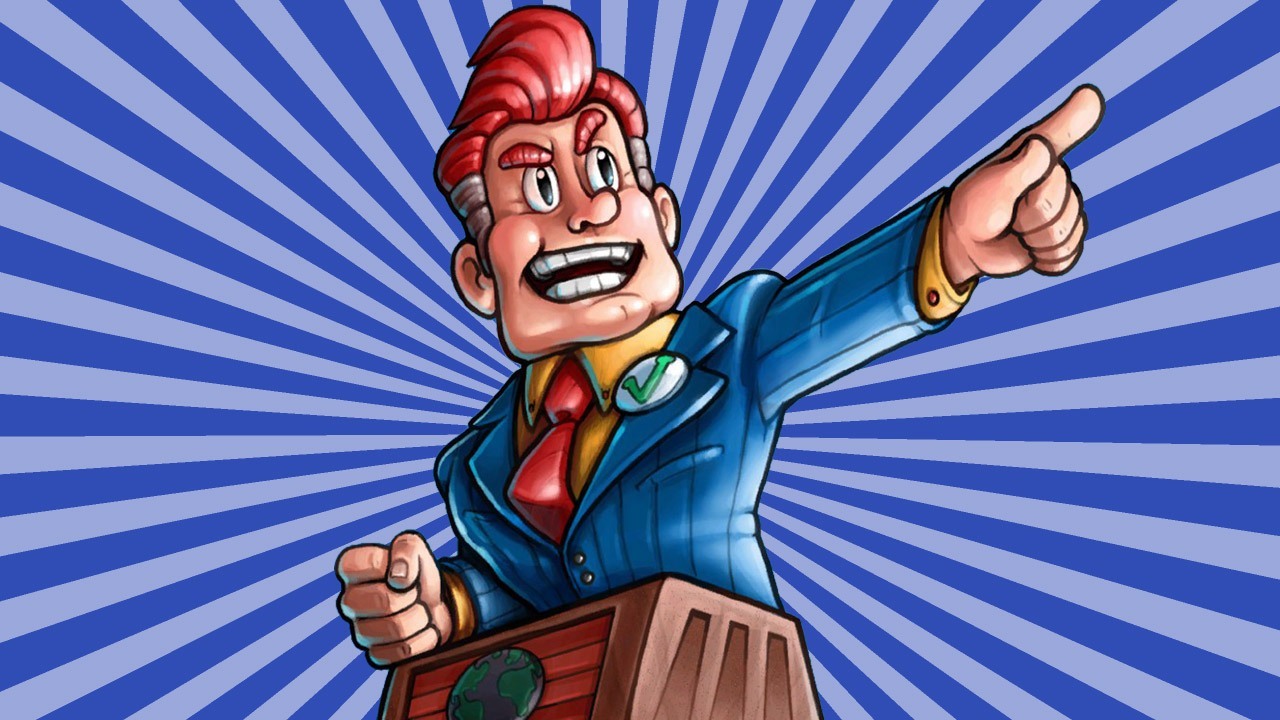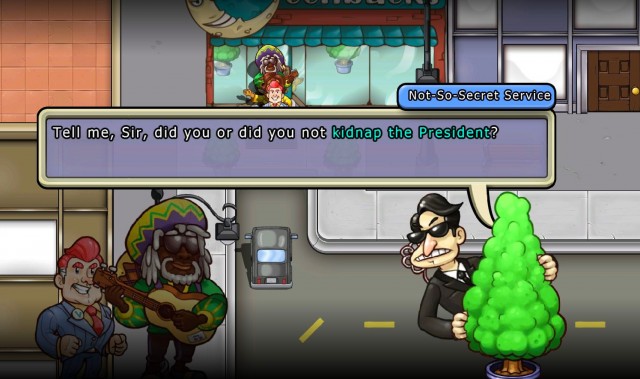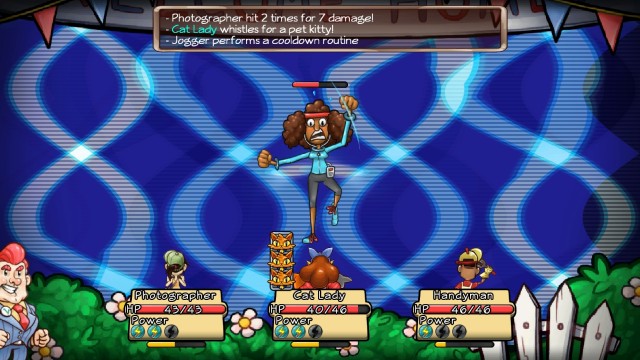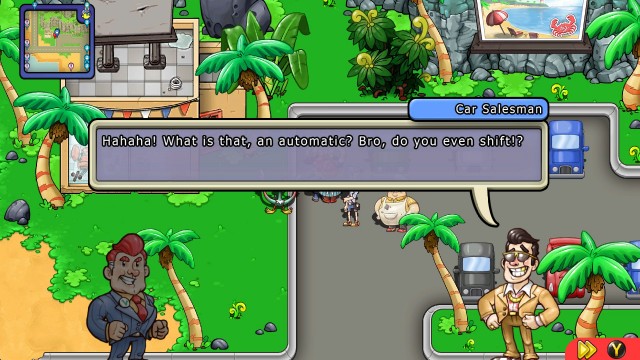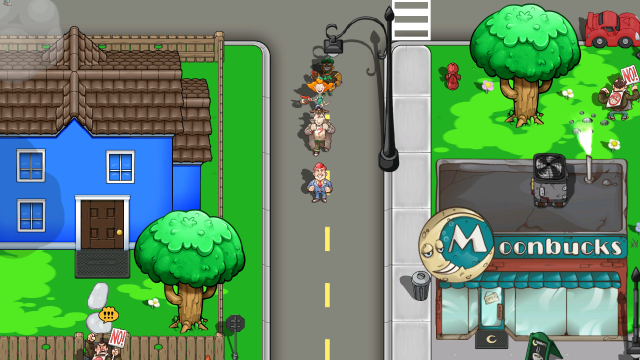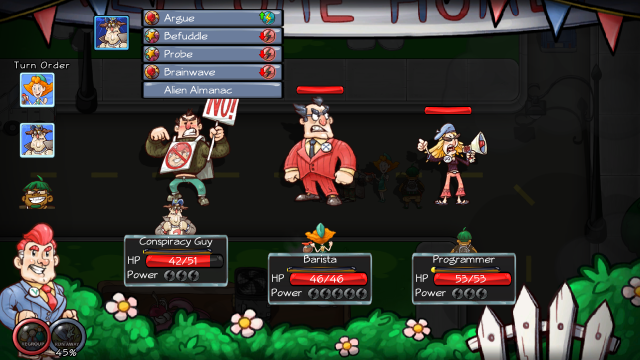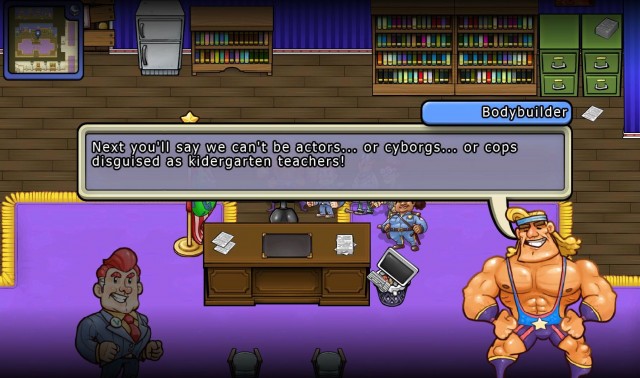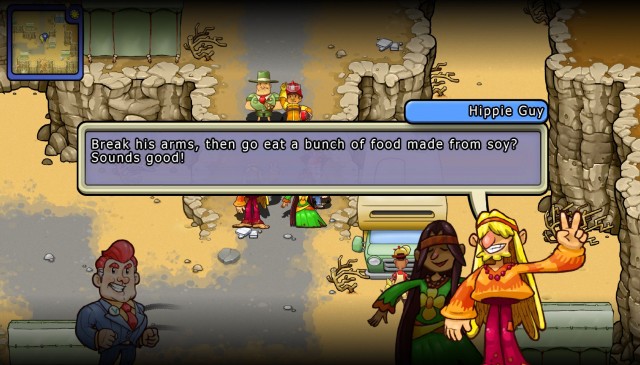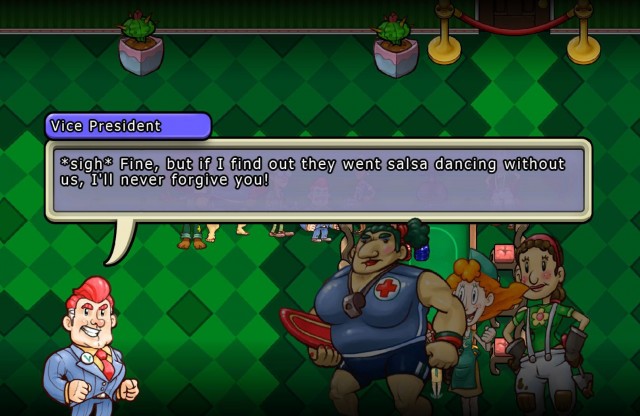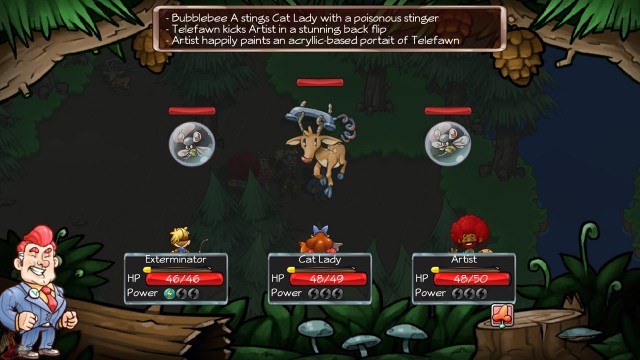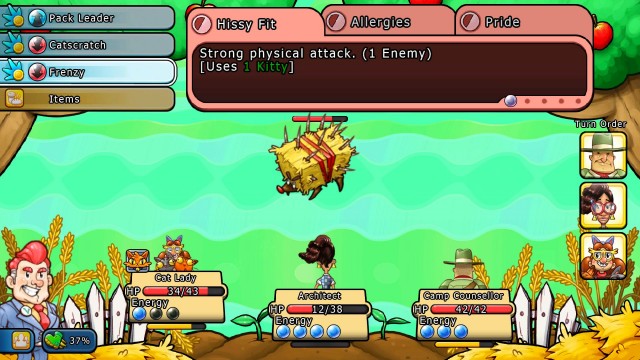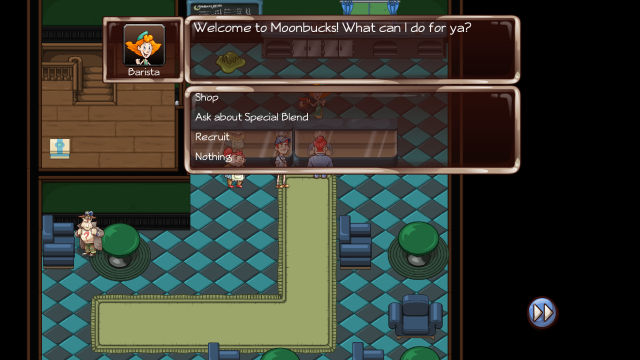UPDATE: I’ve amended some of the review text to make more explicitly clear that Citizens of Earth has had a major patch since launch, which cleaned up some of the issues that launch reviews complained about, though not all of them. I apologize if there has been confusion when comparing my post-patch review to the pre-patch reviews from many other game reviewers published for the game’s launch, and I don’t want to represent Citizens of Earth unfairly by possibly having readers think that the patch has not made improvements, since I previously failed to bring it up. It has made improvements. It’s just not a universal fix. Many instances of crashing, clipping issues and audio/visual cutouts that used to be in the game have been fixed by this patch (though some do remain), and I’ve also added into the text that the patch grants both a retro 8-bit soundtrack option to Citizens of Earth, as well as cross-save for the PlayStation builds, though cross-buy is still not present unfortunately. I didn’t change the review score however, as my verdict stands, and my assessment of the game remains unchanged.
Thank you to the readers, and developer Eden Industries, who inquired about making sure that I played the patched version, which I and others can tell by seeing “1.1.0” on the title screen. Like I said, it’s my utmost concern that I represent games that I review both impartially and fairly, and while I still warn of some technical hiccups, I nonetheless feel that Citizens of Earth is worth your consideration, if you’re already interested.
Original review follows:
Like its bumbling politican protagonist, Citizens of Earth is a well-meaning charmer that’s easy on the eyes, but in terms of actually doing its job, it’s not always as reliable as it should be. Still, there’s been an overabundance of dark and dreary RPG’s in recent years, which helps Citizens of Earth stand apart for its more bright, upbeat disposition. In fact, it’s said disposition and sense of humour that will help RPG enthusiasts forgive the game’s rather frequent technical hiccups and gameplay issues.
Citizens of Earth was originally unveiled as a Kickstarter project by its developer, the Vancouver-based Eden Industries, where it was initially planned for PC, but unfortunately failed to achieve funding and meet its Kickstarter goal. Fortunately, the project ended up being rescued by niche RPG specialists, Atlus, who took on publishing duties, and also allowed for ports on current Nintendo platforms and PlayStation platforms to go along with the previously planned PC version.
The idea behind the game as a comedy RPG is very inspired, having players take control of a charming, but seemingly useless high-ranking politician, who must rally everyday citizens to his cause when he’s forced to save the world. This already puts Citizens of Earth in the prime position of being able to crack plenty of jokes related to both politics and video games, and when this is paired with its obvious love of 16-bit RPG’s, particularly Nintendo’s cult Super NES classic, Earthbound, it makes for a package that any RPG fan will have a very hard time passing up.
But should you actually play Citizens of Earth? Well, sure, if you’re interested, so long as you’re not expecting the world from it. The game makes for a pleasant distraction for those whose love of RPG’s runs deep, or are simply interested in getting their feet wet with the genre, but you’ll need to put up with a few troublesome elements that will test your patience, even if the lovable exterior will keep you pushing through the annoyances.
Citizens of Earth isn’t going to blow your mind with its simple, idyllic 1950’s America-esque art style, but on the four platforms that support HD in particular, the game is very appealing to look at. Each character is given vibrant, detailed designs, as are the enemy sprites in battles, even if they’re complemented by the same colourful surrealist backgrounds in fights that are clearly ripped straight from Earthbound. Likewise, the environments that comprise the modestly-sized game world are well-designed and fairly simple to learn your way around, even if some subtle slopes and entrances can occasionally be excessively difficult to spot in busy areas like deserts, and a particularly troublesome hedge maze.
This issue is at its worst in the 3DS version, which is the only one of the five that doesn’t have HD visuals. In fact, from a visual standpoint, the 3DS version is a bit underwhelming, since several of the sprites and environmental details are poorly compressed and look blurry, and there’s several instances where the framerate will chug whenever prompts or contextual loads are made. The biggest disappointment of all however is that the 3DS version doesn’t display in 3D at all, period, which eliminates a big draw that this version of the game could have had for those who own multiple current platforms. Those playing on a 2DS, or who permanently keep the 3D Slider flicked off, won’t know the difference, but those who relish the 3D capability in the 3DS handhelds will probably be let down significantly, especially with the colourful, eye-popping art style appearing to beg for some kind of 3D effect, at the very least in battles.
On the plus side however, the 3DS version is actually a bit easier to navigate, and feels a bit more cleanly presented than its four counterparts. Eden Industries has done a good job of tailoring the game to the 3DS, beyond the disappointing omission of 3D effects anyway, with players conveniently able to tap through menus on the Touch Screen, allowing them to shuffle their Citizens and select option prompts with a quick tap of the stylus. Likewise, battles are allowed to unfold more cleanly on 3DS than the other versions, as battle details are kept on the Touch Screen, while the Top Screen displays the fight itself, along with your characters’ stats. Outside of battle, those playing the 3DS version can also view a persistent scrolling map on the Touch Screen in both outdoor environments and in towns (though sadly, not in dungeons), which is an extremely helpful advantage in terms of the sometimes irritating environment navigation that the other four versions of Citizens of Earth don’t offer.
That said however, the other four versions do have their own big advantage, that being very appealing HD graphics. Everything is kept on one screen in their case however, with the menu taking the form of a tablet that you have to pull up by pausing the game, and that’s especially disappointing in the Wii U version, which feels like a rather unremarkable port, simply streaming the television image on to the Wii U Gamepad Screen for off-TV play. Not allowing you to use the Wii U Gamepad Screen as an on-the-fly Citizen manager or inventory, like with the Touch Screen on 3DS, feels like a huge missed opportunity, especially since the Wii U version of Citizens of Earth didn’t even release with any alternate control methods beyond the Wii U Gamepad. The Wii U version still looks great though at least, boasting crisp native 1080p HD visuals that have it pretty much standing par with the PS4 and PC versions.
Naturally, the PS4 version looks pretty sharp as well, with the PC version having pretty undemanding system requirements, and still looking very glossy and eye-catching on even a lower-end rig. Citizens of Earth is a pretty good-looking PS Vita game as well, where it still enjoys the HD capability afforded to it on PC, PS4 and Wii U, even if at the expected decreased portable resolution. The downside to the presentation being at its best on these platforms however, beyond the dual-screen presentation advantage in the 3DS version, is that they all come with considerable and frequent load times. These load times are especially shocking on powerful platforms like the PS4 and high-end PC’s, especially since the graphics of Citizens of Earth aren’t anything earth-shattering, though PS Vita players may expect the loading demands, since PS Vita ports of games on consoles and PC tend to have load times like these. Strangely, the 3DS version’s load times are actually a bit shorter than the other four platforms, and they tend to be pretty snappy if you’re playing on a New 3DS XL especially, even if they’re no less frequent. The Wii U version used to have the worst load times, though a patch has since made them quicker, and more along the lines of the PS4 and PC load times.
Sadly though, all five platforms seem to have their share of visual loading glitches, albeit less than at launch, which are among the potpourri of bugs that Citizens of Earth has sadly continued to suffer from even now, which tend to vary between platforms. At worst, improper visual loading can lead to sudden crashes, forcing you to reboot the game, and not one of the five platforms is entirely safe from this. Crashes are at their most rare on 3DS, and only seem to be triggered under very specific circumstances in one or two places, and the PC version crashes pretty rarely itself. The PS4 and PS Vita versions are more likely to crash, though a patch has helped fix some of their stability issues, even if the PS Vita version remains a tad more reliable than the PS4 version. The Wii U version can be pretty shaky itself, also crashing at random, though uncommon intervals, and you’re also most likely to run into things like battle graphics not loading properly on Wii U, which is a bummer for those preferring to play on Nintendo’s console.
Still, when Citizens of Earth isn’t bugging out or crashing on those handful of unlucky occasions, it looks good, even if not mind-blowing. There’s a lot of polish in the character models and environments, even if battles look pretty tame by the standards of most RPG’s, with rudimentary graphics and text prompts punctuating every action, again, much like Earthbound. Eden Industries clearly put a lot of care into the game’s visual style, which is why it’s unfortunate that they still haven’t been able to completely iron out the stability problems and graphical hiccups that are especially prevalent in some versions of the game, though again, they were worse at launch, before a major patch eliminated at least a good chunk of them.
Citizens of Earth’s soundtrack immediately cranks the quirky factor up to 11, and that’s perhaps not surprising. The catchy MIDI tunes that play in each area are fun to listen to, and often very playfully quaint, effectively calling back to that more innocent era of 16-bit RPG design from the Super NES days. Likewise, battle themes are pretty understated, with the slow, methodical trance beats and carefree woodwind tunes resulting in a handful of battle themes that effectively adjust themselves to the scale of the threat at hand. It’s what one could easily describe as a ‘fun’ soundtrack, and, again, it calls back quite liberally to the music sensibilities of Earthbound.
The post-patch version of the game also adds in a retro soundtrack option, which makes the music play in an 8-bit, NES-like style. It’s an optional format that’s buried in the game’s settings, but it’s a neat touch by Eden Industries, especially the 8-bit tracks are about equal to and sometimes superior to the main Super NES-inspired MIDI soundtrack.
Sound effects are very slapstick-y, and firmly rooted in cartoon sensibilities. Even combat never feels truly violent in Citizens of Earth, which, as with the music, is very playful and carefree. ‘Attacks’ often take the form of benign workplace gestures, verbal tirades, and only occasionally an actual weapon. Even then though, the fact that the game includes ‘verbal’ attacks as an actual element should tell you what kind of audio atmosphere Citizens of Earth is trying for. It’s too bad that the atmosphere is occasionally disturbed by audio glitches however, which seem especially prevalent on 3DS, having music, sound effects, voice acting or all of the above simply cut out at random, then return as normal after you visit a new area. It’s an odd bug, and it’s not particularly harmful, but it does feel sloppy and hurt the immersion when it does show up.
The real highlight of the audio definitely comes from the voice acting, which is actually excellent! Your lead character, the ‘Veep’ of the free world, is particularly fun to listen to, with his unflappable, oblivious temperament never faltering, and his fellow Citizens also having effectively distinct and memorable personalities in their dedicated dialogue prompts, even if they are sadly reduced to generic grunts and canned lines during story scenes where the game obviously can’t account for which of the 40 (yes, 40!) potential player characters you may have in your party at any given point.
Still, Citizens of Earth is absolutely packed with personality, and the superb voice acting best exemplifies this. That’s why it’s too bad that the sometimes tedious gameplay can’t consistently keep pace with the highly entertaining presentation.
Citizens of Earth is packed to burst with fantastic ideas. It doesn’t totally realize all of them, but it has enough to allow it to effortlessly stand apart from other RPG’s, with heaps of charm to spare.
As I’ve well established by now, the game most frequently takes after Earthbound, between its colourful presentation, silly sense of humour, and straightforward, accessible turn-based combat, complete with enemy encounters that are visible in your environment. The game does take some small gameplay elements from other cult RPG’s though, with the development of Citizens’ non-combat-related vocational tasks to open up new paths and give you new navigation tools feeling like an undeniable mechanic taken from Little King’s Story, while the large cast of 40 characters that each possess innate elemental affinities and unique techniques to set them apart definitely feels like it came straight out of Chrono Cross.
Citizens of Earth isn’t all borrowed mechanics though. The idea of doing favours for everyday Citizens to recruit them into your party feels mostly original (even if it may remind some of recruiting the 108 Stars of Destiny in any given Suikoden game), particularly from the standpoint of a politician trying to court voters, especially since the Veep himself hilariously never participates in combat, yet constantly interjects comments from the sidelines. Some of the necessary minigames and fetch quests to recruit certain Citizens are annoying, but that doesn’t do enough to eliminate the innate appeal of doing good deeds to rally voters to your side.
Likewise, the game nicely simplifies a stand-in for MP or PP in many RPG’s, where players have a certain amount of ‘Energy’ nodes, which they generally build up by using normal attacks, expending anywhere from one to three Energy nodes to use especially potent special techniques. Players will also gain additional Energy by using techniques that exploit an elemental weakness of their foe, and will start battles with an additional Energy node if you successfully ‘ambush’ an enemy in the field, which is done by having the Veep command your party to charge at them when they’re facing away. On the flip side however, you’ll lose a node of Energy if you’re hit by an elemental attack that the character in question is weak against, and you’ll also start battles with lost Energy if enemies manage to touch your party members while they’re facing away in the field.
This is a smart, easy-to-understand system that even those new to RPG’s won’t have trouble wrapping their heads around. Helping matters is the fact that the straightforward nature of the game, which is rooted in real-world political satire as much as it is playful jabs at video game history, makes Citizens of Earth a solid choice for uninitiated players that want to get their feet wet with an accessible modern RPG, even if they’ll still need a good amount of patience for the tedious bits. Sure, all five platforms have better RPG options for newcomers or simply more casual players, but if you’re particularly attracted to the political flavour of the comedy in Citizens of Earth, it’s a legitimate option.
Sadly though, RPG veterans may find themselves a bit underwhelmed by the gameplay of Citizens of Earth, which, all design flaws aside, is often far too easy on the default difficulty setting. One of the characters that you can recruit allows you to make the difficulty harder, which also awards you more EXP for winning battles, just like reducing the difficulty earns you less EXP than normal, but even when you bump up the challenge, Citizens of Earth won’t be much of a challenge for those well-versed in the RPG genre, and especially in retro RPG’s.
Still, there is nonetheless an inherently enjoyable element to gradually increasing your throngs of Citizens, doing good deeds around the game world, and helping your Veep build up his ranks all the more. Some Citizens are obviously harder to recruit than others, and some are certainly more useful in combat than others, but every Citizen has their own specific use, so they’re all worth seeking out. Some are good fighters in combat, some are effective healers or support specialists more so than offensive battlers, and in many cases, some provide important functions outside of battle, such as fixing broken doors, building bridges to new areas, or flying you to previously visited locations to save a lot of walking time. It’s a bit annoying that you have to use each individual Citizen in battle a certain amount of times to fully unlock the potential of their ‘Talent’, the unique passive skill that you can call upon them for outside of combat, but it’s great that none of them feel like they’re just taking up space in the roster. At a certain point in the game, you’re bound to stick to one combat team as you near the climax especially, but it never hurts to do what you can to recruit a Citizen. They’re all good for something!
Of course, even beyond recruiting Citizens, you can undertake a good chunk of side quests to help buoy the main 15-20-hour adventure in Citizens of Earth, which can present rewards such as special stat-altering items for your Citizens, which take the place of actual equipment (there’s no weapons or armour to equip in Citizens of Earth, for anyone), or grant you more items, money, and more often than not, bonus EXP for your active party members. You can get through the entire game without doing a single side quest, but they’re not complex quests, and the rewards are worth it for those who want to keep their resources high, or simply enjoy doing good deeds for NPC’s. There’s also in-game Challenges that reward your active party members with bonus EXP when you accomplish them, which help keep the replay value high for the 3DS and Wii U versions that predictably lack the achievements/trophies on offer for PC, PS4 and PS Vita, though be advised that they’re only properly tallied with the Steam Achievements in the PC version. For some reason, the PS4 and PS Vita builds only make a small handful of the Challenges register as trophies, and predictably, there’s no Platinum on offer for either of them.
Somewhat ruining the enjoyment of being a well-meaning politician however is the game’s absurdly high encounter rate. Even with enemies visible on the field, they often come in droves, and are annoyingly difficult to dodge, particularly with the Veep’s party members all following him in a large line, thanks to the very ornately designed environments. This may well be an intentional callback to 16-bit RPG’s, which had similarly high encounter rates, but this was a mechanic that was better left in the past. It’s hard to enjoy environments and gameplay in Citizens of Earth when you’re constantly being assaulted by uniquely designed, but mostly straightforward baddies, which will quickly render you spectacularly over-leveled if you never flee from fights and don’t spread yourself too thin between Citizens, making the vast majority of the game a cakewalk if you do anything less than crank the difficulty to max. Some especially packed areas like Casino Canyon had their enemy counts reduced post-patch, but there’s still an excess of enemy encounters against underpowered foes throughout much of the game.
Also sometimes ruining your enjoyment of the game is the bevy of glitches that can crop up at any point. I’ve already gone over the occasional crashing issues and audio hiccups that Citizens of Earth sometimes suffers from on any platform, but the game also seems to possess clipping issues, even post-patch, sometimes having you get stuck in scenery if you approach objects the wrong way, which will likely result in you having to, you guessed it, reset the game, or perhaps have a Citizen like the Pilot and her teleporting capability try and bail you out. There’s also rare instances where contextual prompts won’t appear, which can especially be a nuisance when you have to interact with something to proceed the story, or whatever your active quest is. The game at least auto saves rather frequently, and allows you to make manual saves outside of combat wherever you wish, with reloading your game seeming to fix any glitches that come up for that instance, but that doesn’t change the fact that an indie RPG like this doesn’t benefit from annoying bugs of this nature.
Lastly, Citizens of Earth really could have used better directions for main story quests especially. Again, this vague communication from the game may be intentional, as 16-bit RPG’s and especially 8-bit RPG’s were sometimes infamously vague about how you had to proceed events, but yet again, this was a design style that was better left in the past. Unless you have tons of patience and free time, you won’t enjoy the game deliberately wasting your time and forcing you to wander around aimlessly for hours, simply because it doesn’t give you a clear idea of how you’re supposed to proceed. As long as the game is specific about what you need to do and where you need to go, the player can do the rest, but forcing someone to stumble into a solution or a path to progress is not intuitive nor fun, it’s just irritating. Making matters worse is that Citizens of Earth often forces you to run back and forth between various corners of the small-scale game world to proceed main story quests especially, which just feels like transparent padding for an RPG that’s still shorter than most, and makes the weaker gameplay elements all the more tedious.
Citizens of Earth nonetheless proves itself very difficult to dislike though, even at its most annoying. Its foundation has a ton of inspiration and heart behind it, and the chipper presentation and often laugh-out-loud funny dialogue will help players forgive the slog to get to such entertaining moments. The gameplay doesn’t manage to compare to the cosmetic elements and writing behind Citizens of Earth, but it’s a competent RPG for even less initiated players, even if also a slow-paced and sometimes buggy one.
Citizens of Earth has an oddly-paced story that feels a little scattered. The final resolution of it all is a bit of a leap, and the game’s slow pacing makes the climactic sequence feel like it came out of nowhere. It’s not a bad storyline by any means, particularly since the game’s concept is great, but the execution of the plot doesn’t totally capitalize on the potential of the concept that it set out with.
Still, you certainly won’t overthink the story of Citizens of Earth, as it immediately sets out to be as weird and silly as possible, and in going for broke, it’s often pretty funny. The jokes throughout the game are well-written, as are the cheeky references to other video games and elements of gaming culture, and the great voice acting makes them all the better.
The individual moments in Citizens of Earth are better than the grand sum of its plot, but it’s definitely a game with a lot of character. Even when the gameplay stumbles a bit, you’ll still be smiling at the earnest goofiness of the story unfolding around you, even if it’s all about silliness and little else.
With so much overwrought melodrama throughout many modern RPG’s though, maybe some simple silliness isn’t such a bad thing, so long as you’re not expecting more.
Citizens of Earth is a flawed game, but its heart is in the right place, and it makes for a charming, light-hearted RPG for both avid enthusiasts and newcomers to the genre. It’s best grabbed on sale, particularly since the PlayStation builds strangely don’t offer cross-buy (obviously, the 3DS/Wii U versions don’t either), though cross-save has been patched in if you pay for both the PS4 and PS Vita versions individually. Regardless, some of the annoyances and glitches may have some would-be players feeling like the game isn’t worth its full $14.99 price. Its 15-20-hour length, not including side quests, recruitment and chasing achievements/trophies, is not bad for an indie RPG at that price though.
Between the five versions, the most recommendable is definitely a tie between the PC version and the 3DS version. Despite being the ugliest version, and not even having 3D capability, the 3DS version is especially well-presented and definitely the most stable of the lot, feeling more intuitive than the rest with navigation especially. The PC version meanwhile is also one of the more stable versions, especially post-patch, and its especially large count of Steam Achievements will have players busy for quite a while. PlayStation gamers will sadly be in for a rougher, more disappointing time with Citizens of Earth, as the PS4 and PS Vita builds still crash on occasion, the heavily diminished handful of trophies feels bizarre and annoying, and there’s absolutely no excuse for the game not to support cross-buy, as virtually every indie offering that has released for both PS4 and PS Vita in recent years grants you both versions with one purchase of either. The Wii U build is also a bit of a let-down, as it makes no real effort to take advantage of the Wii U’s capabilities beyond HD support and off-TV play, which is all the more damning when the 3DS version is so well-tailored specifically for Nintendo’s handheld, lack of 3D aside. If Wii U is your only option though, it’s a functional port, with the patch thankfully fixing its especially sluggish load times.
If you’re looking for something on par with the legacy of Earthbound, or even more recent highly successful comedy RPG’s like the Mario & Luigi games or South Park: Stick of Truth, Citizens of Earth sadly falls short. Those drawn to the art style or political bend of the humour however will find a game that’s satisfactory, if not amazing, though also one that feels like it falls short of its potential.
Still, said potential could always be fully tapped in a more refined, hopefully less buggy sequel, so hopefully Citizens of Earth is profitable enough to get one. To state the obvious pun, Citizens of Earth is worth election by a handful of swing votes, if this is the kind of game your dollars would be inclined to vote for, but if it wants to secure enough votes for another term, it may want to ensure that its next run in office is as good as its campaign efforts.

